Aromatherapy eases anxiety by tapping into your body's natural stress-response systems. When you inhale essential oils, they interact with your olfactory system and limbic brain, triggering relaxation responses. Oils like lavender, chamomile, and bergamot have been shown to lower cortisol levels and promote calmness. You can use diffusers, topical applications, or direct inhalation to experience these benefits. For beginners, start with gentle oils and proper dilution techniques. Incorporate aromatherapy into your daily routine for consistent anxiety relief. By understanding the science behind aromatherapy and learning safe practices, you'll reveal a powerful tool for achieving serenity in your life.
Understanding Aromatherapy's Anxiety-Reducing Effects
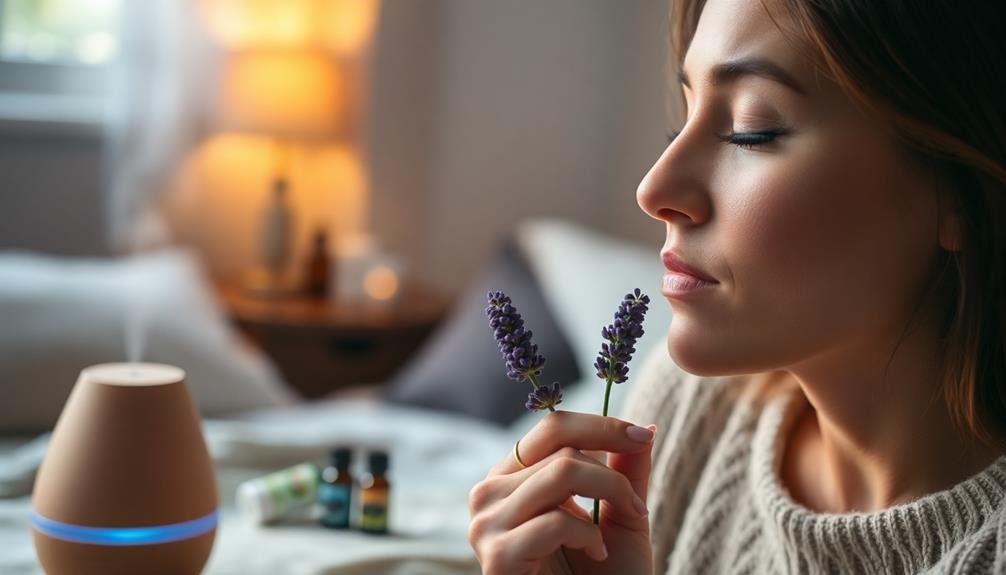
In light of the growing interest in natural remedies, aromatherapy has emerged as a popular method for managing anxiety. This practice utilizes essential oils derived from plants to promote relaxation and reduce stress. When you inhale these aromatic compounds, they interact with your olfactory system, triggering responses in your brain that can calm your nervous system.
The anxiety-reducing effects of aromatherapy are primarily attributed to the way certain scents influence your limbic system, which is responsible for emotions and memory. Essential oils like lavender, chamomile, and bergamot have been shown to decrease cortisol levels, the hormone associated with stress. They can also increase the production of neurotransmitters like serotonin and dopamine, which contribute to feelings of well-being.
You'll find that aromatherapy's effectiveness isn't just anecdotal. Scientific studies have demonstrated its potential to alleviate symptoms of anxiety disorders.
Essential Oils for Calming Nerves
Among the various essential oils available, several stand out for their remarkable ability to calm nerves and reduce anxiety. You'll find lavender, chamomile, bergamot, and ylang-ylang particularly effective for soothing your mind and body.
These oils work by interacting with your limbic system, influencing your emotions and stress responses.
When using essential oils for anxiety relief, you can:
- Diffuse them in your living space
- Apply them topically (diluted with a carrier oil)
- Add a few drops to your bath
- Inhale directly from the bottle
Lavender is renowned for its calming properties and can help improve sleep quality.
Chamomile promotes relaxation and reduces tension.
Bergamot uplifts your mood while easing stress, and ylang-ylang slows rapid heartbeat and lowers blood pressure.
Diffusion Methods for Beginners
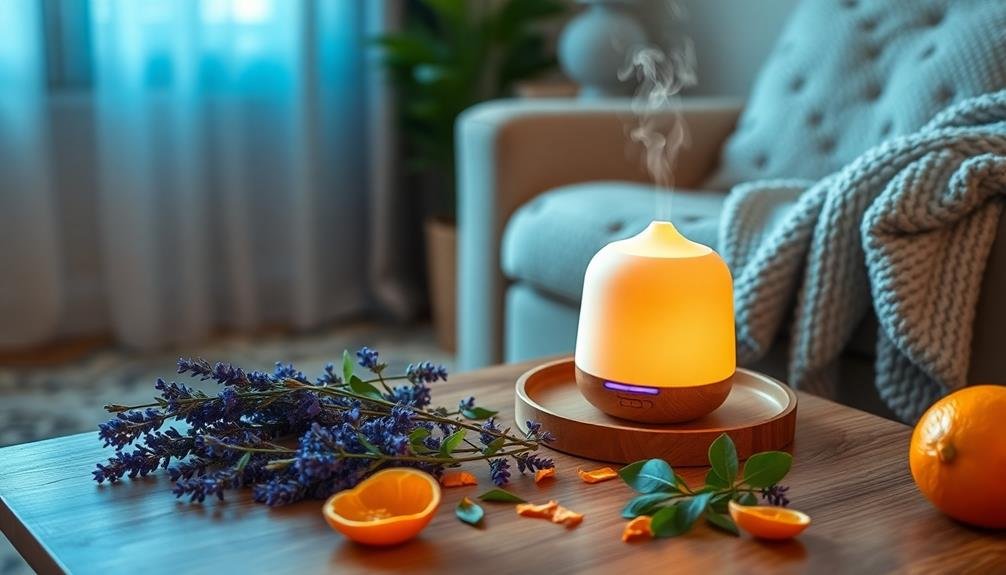
Now that you're familiar with the best essential oils for anxiety relief, let's explore how to effectively disperse them throughout your space. The most common and user-friendly method for beginners is using a diffuser. These devices come in various types, including ultrasonic, nebulizing, and heat diffusers.
Ultrasonic diffusers are popular due to their ease of use and dual function as humidifiers. They use water to create a fine mist that carries the essential oil particles into the air.
Nebulizing diffusers, on the other hand, don't require water and disperse pure essential oils, making them more potent but also more expensive.
For a low-tech option, you can try the evaporation method. Simply add a few drops of oil to a cotton ball or tissue and place it near a fan or air vent.
You can also create a room spray by mixing essential oils with water in a spray bottle. For personal use, consider using an essential oil inhaler or applying diluted oils to your skin using a roller bottle.
Remember to always dilute oils properly and start with small amounts to gauge your sensitivity.
Creating Relaxing Aromatherapy Blends
Creating your own aromatherapy blends can be a rewarding and personalized approach to managing anxiety. By mixing essential oils, you'll tailor scents to your preferences and specific needs.
Start with a base oil like jojoba or sweet almond, then add drops of your chosen essential oils. Lavender, chamomile, and bergamot are popular choices for relaxation, while ylang-ylang and frankincense can help ground your emotions.
When creating your blends, consider these key points:
- Always dilute essential oils properly to avoid skin irritation
- Start with a 2% dilution (12 drops of essential oil per ounce of carrier oil)
- Keep a record of your recipes to replicate successful blends
- Experiment with different combinations to find what works best for you
Incorporating Aromatherapy Into Daily Routines
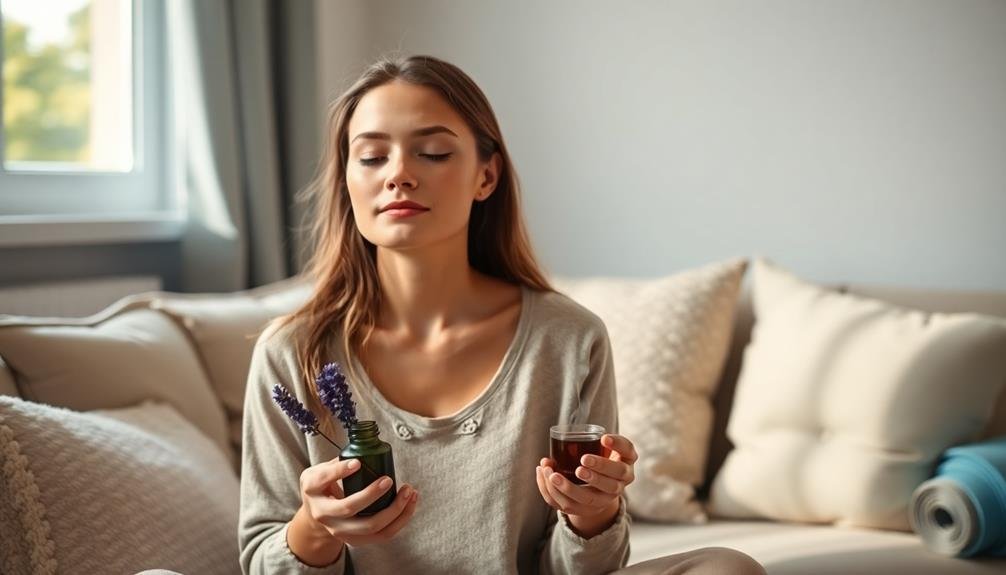
With a few simple strategies, you can seamlessly integrate aromatherapy into your daily life to manage anxiety. Start by placing a diffuser in your bedroom and add calming essential oils like lavender or chamomile before bedtime. This will help create a relaxing atmosphere for better sleep.
In the morning, apply a few drops of an invigorating blend, such as peppermint and lemon, to your wrists or use a personal inhaler. This can boost your mood and energy levels as you start your day.
Keep a roller bottle of your favorite anxiety-relieving blend in your bag or desk drawer for quick application during stressful moments at work or while running errands.
Transform your shower into a spa-like experience by adding a few drops of eucalyptus oil to the shower floor. The steam will disperse the aroma, providing a reviving and calming effect.
For a midday pick-me-up, use a facial mist infused with rose or neroli oil to hydrate your skin and soothe your mind. By incorporating these simple practices into your routine, you'll harness the anxiety-reducing benefits of aromatherapy throughout your day.
Safety Precautions for Anxious Beginners
When you're new to aromatherapy, it's vital to understand proper essential oil handling to guarantee your safety.
You'll need to learn about correct dilution and application methods to avoid skin irritation or other adverse reactions.
It's also important to be aware of potential contraindications and allergies, as some essential oils may interact with medications or trigger allergic responses in certain individuals.
Proper Essential Oil Handling
Essential oils' potency demands careful handling, especially for anxious beginners venturing into aromatherapy. You'll need to exercise caution to guarantee your safety and maximize the benefits of these powerful plant extracts.
Always dilute essential oils before applying them to your skin, as their concentrated nature can cause irritation or allergic reactions when used undiluted.
When working with essential oils, follow these key guidelines:
- Store oils in dark glass bottles away from direct sunlight and heat to preserve their potency.
- Keep oils out of reach of children and pets, as ingestion can be harmful.
- Use a carrier oil (like jojoba or coconut oil) to dilute essential oils before topical application.
- Perform a patch test on a small area of skin before using a new oil to check for sensitivity.
Remember to wash your hands thoroughly after handling essential oils to avoid accidentally transferring them to sensitive areas like your eyes or mucous membranes.
If you're pregnant, nursing, or have any medical conditions, consult with a healthcare professional before incorporating essential oils into your anxiety management routine.
Dilution and Application Methods
For anxious beginners, proper dilution and application of essential oils are essential steps in ensuring a safe and effective aromatherapy experience.
Always dilute essential oils in a carrier oil, such as jojoba or coconut oil, before applying them to your skin. A general rule of thumb is to use a 2% dilution, which means adding 12 drops of essential oil to one ounce of carrier oil.
When it comes to application methods, you have several options. For topical use, apply the diluted oil to your pulse points, such as wrists, temples, or behind the ears. Alternatively, you can add a few drops to a warm bath or use them in a diffuser for inhalation.
If you're new to aromatherapy, start with gentler oils like lavender or chamomile.
Remember to patch test any new oil mixture on a small area of skin before widespread use. If you experience any irritation or discomfort, discontinue use immediately.
It's also essential to keep essential oils away from your eyes, mouth, and sensitive areas. By following these safety precautions, you'll be able to enjoy the anxiety-relieving benefits of aromatherapy without unnecessary risks.
Contraindications and Allergies
While aromatherapy can be beneficial for anxiety, it's crucial to be aware of potential contraindications and allergies. Before using essential oils, consult your healthcare provider, especially if you're pregnant, nursing, or have underlying health conditions. Some oils can interact with medications or exacerbate certain medical issues.
Always perform a patch test before applying any new oil to your skin. Place a small amount of diluted oil on your inner forearm and wait 24 hours to check for any adverse reactions. If you experience redness, itching, or swelling, discontinue use immediately.
Be cautious when using essential oils if you have:
- Asthma or respiratory issues
- Sensitive skin or eczema
- Epilepsy or seizure disorders
- Allergies to specific plants or fragrances
Remember that essential oils are highly concentrated and potent. Never ingest them or apply them undiluted directly to your skin.
If you're new to aromatherapy, start with gentle, well-tolerated oils like lavender or chamomile. Always follow proper dilution guidelines and use high-quality, pure essential oils from reputable sources to minimize the risk of adverse reactions.
Frequently Asked Questions
Can Aromatherapy Replace Prescribed Anxiety Medications?
You shouldn't replace prescribed anxiety medications with aromatherapy. While it can be a helpful complementary technique, it's not a substitute for professional medical treatment. Always consult your doctor before making changes to your anxiety management plan.
How Long Does It Take to Feel the Effects of Aromatherapy?
You'll typically feel aromatherapy's effects within minutes. Inhaling essential oils can quickly impact your mood and nervous system. However, for long-lasting benefits, you might need regular use over days or weeks to notice significant changes.
Are There Any Age Restrictions for Using Aromatherapy?
You'll find that aromatherapy doesn't have strict age restrictions. However, it's best to use caution with infants, young children, and elderly individuals. Always dilute essential oils properly and consult a healthcare professional if you're unsure about safety.
Can Aromatherapy Help With Specific Phobias or Panic Attacks?
Yes, aromatherapy can help with specific phobias and panic attacks. You'll find certain scents can calm your nerves and reduce anxiety symptoms. Try lavender, bergamot, or chamomile essential oils to ease your fears and promote relaxation.
Is It Safe to Use Aromatherapy During Pregnancy or While Breastfeeding?
You should consult your doctor before using aromatherapy during pregnancy or breastfeeding. Some essential oils can be safe, but others may pose risks. Always dilute oils properly and avoid applying them directly to your skin.
In Summary
You've now got the basics to start your aromatherapy journey for anxiety relief. Remember, it's not a cure-all, but it can be a powerful tool in your self-care arsenal. Start small, experiment with different oils and methods, and listen to your body. With consistent use, you'll likely find yourself feeling calmer and more centered. Don't forget to prioritize safety, and enjoy the soothing scents as you commence this aromatic path to serenity.


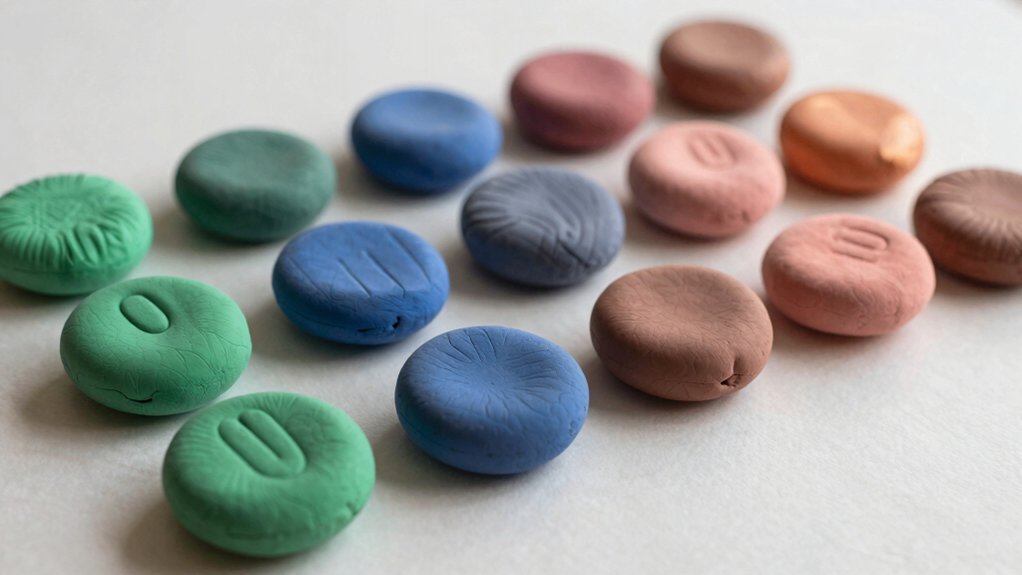
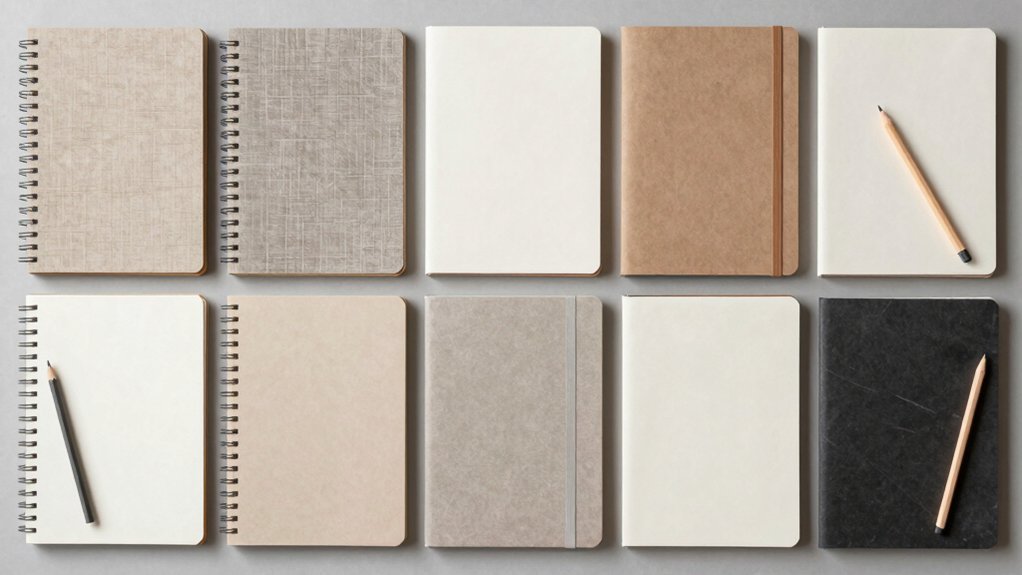
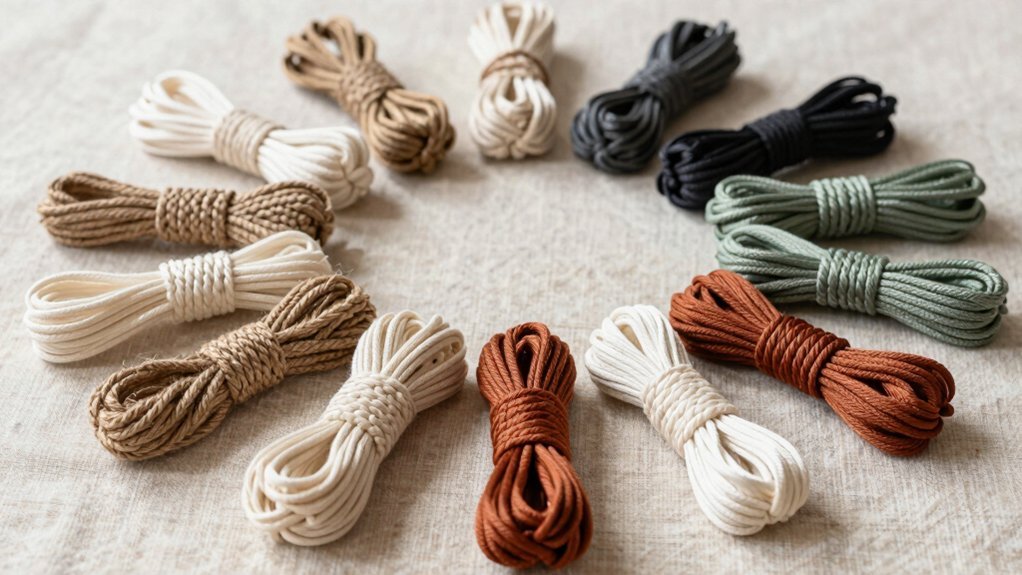
Leave a Reply